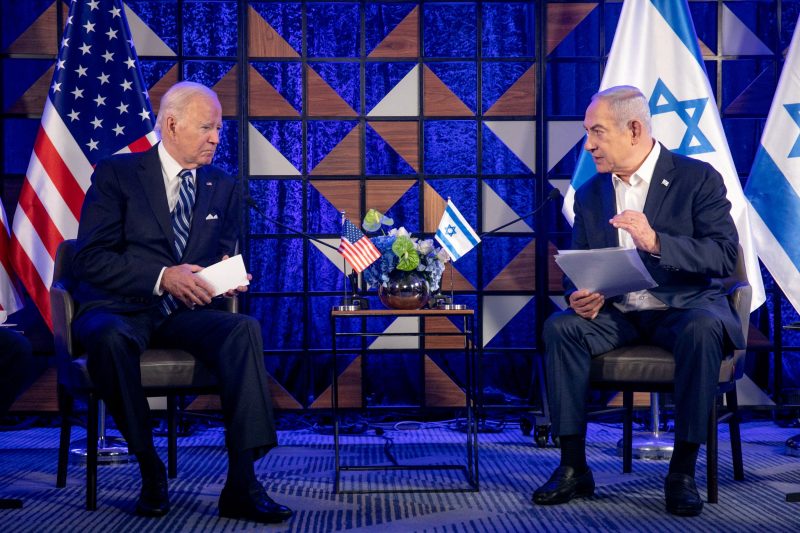In the days after the deadly Oct. 7 attack, Israeli Prime Minister Benjamin Netanyahu had a request for President Biden: Could he pressure the Egyptian president to open his country’s borders and take in a big portion of the more than 2 million Palestinians in Gaza?
Biden told Netanyahu the idea was a non-starter with the Egyptian government, which has made clear it has no interest in accepting Palestinian refugees and playing any role in their mass displacement. But many Israeli officials still favor the request, which has not been previously reported, underscoring the stark differences between the United States and Israel over what should happen in Gaza in the near- and long-term after Israel completes its military campaign there.
So far, Biden has provided unwavering support for Israel’s military campaign in Gaza even as the Jewish state has faced international condemnation amid massive ground and airstrikes that have killed about 20,000 Palestinians. But as part of that support, Biden has repeatedly insisted that the Palestinian Authority, which currently governs part of the West Bank, must also rule Gaza after Hamas is eliminated, and that a Palestinian state must someday be established joining the two territories.
Netanyahu is rejecting those tenets with increasingly forceful public statements, leaving it unclear how the United States and Israel will resolve fundamental differences about the future of the region. The most immediate issue, U.S. officials say, is deciding who will be responsible for governing the tiny enclave on “the day after,” when the fighting in Gaza ends.
While the Biden administration seeks to contain the war to Gaza, and end intensive combat there soon, some Israeli officials are pressing to target the Iran-backed Hezbollah group in Lebanon next, a move U.S. officials have worked for weeks to head off. And American and Israeli officials disagree on how harshly to punish militant Jewish settlers in the West Bank. In other words, Biden and Netanyahu are at odds on virtually all the major questions that will become critical the moment Israel winds down its “Swords of Iron” military campaign.
That divide is driven in part by domestic politics of the two countries, analysts say. After the Oct. 7 attacks, when Hamas militants surged into Israel and killed roughly 1,200 Israelis, the Israeli electorate moved more sharply to the right while Netanyahu’s approval plummeted, and that is pushing the prime minister to embrace the far right as a means of political survival. Biden, for his part, faces intensifying pressure from his Democratic base to stand up to Israel and take concrete steps to help the Palestinians in the face of devastating images of bloodshed and ruin.
“I think Netanyahu as well as Biden are speaking to their political base,” said Eitan Gilboa, an expert on U.S.-Israel relations at Bar Ilan University. “Biden wants a revitalized Palestinian Authority without explaining what that means, and he also wants a two-state solution. Netanyahu is rejecting both.”
The Palestinian Authority has been plagued for years by corruption and weakness, and Gaza voters ousted the PA from their government in 2006, a year after Israel withdrew from the enclave, in favor of Hamas. But U.S. officials argue that there is no alternative to the PA as a pragmatic force representing the Palestinians, and Biden often speaks of a postwar Gaza that would join the West Bank in being run by a “revitalized” Palestinian Authority.
American officials “insist that Gaza must be under Palestinian rule in a way that connects governance in the West Bank with Gaza,” said Martin Indyk, who represented the United States in failed Israeli-Palestinian peace talks under President Barack Obama. “There’s only one legally constituted candidate for this job — the Palestinian Authority.”
“Bibi [Netanyahu] rejects this idea out of hand, because his coalition partners are intent on doing away with the Palestinian Authority,” added Indyk, who is now the Lowy distinguished fellow at the Council on Foreign Relations. “They want to annex the West Bank rather than have the Palestinian Authority govern there, so they don’t want it resurrected via a new role in governing Gaza.”
Netanyahu’s hard-line position is also complicating U.S. efforts to persuade Arab leaders to help rebuild Gaza and guide its political transition after the war. In meetings with top Biden officials, Arab leaders have made clear they will not help with the reconstruction of Gaza without the promise of a “political horizon,” meaning a Palestinian state.
At a news conference in Tel Aviv last week, Netanyahu made a point of boasting about his longtime efforts to prevent the establishment of a Palestinian state and took credit for “putting the brakes” on the historic Oslo peace process brokered by President Bill Clinton. Netanyahu faces intense domestic criticism over the intelligence and military lapses that led to the Oct. 7 attacks, and many analysts expect him to lose his job once the fighting ends.
In response, he is now essentially telling Israelis that the tragedy would have been worse if not for him. “I’m proud that I prevented the establishment of a Palestinian state, because today everybody understands what that Palestine state could have been, now that we’ve seen the little Palestinian state in Gaza,” Netanyahu said.
Netanyahu’s state of mind, diplomats say, is reflected in his drive to pressure Egypt to take in hundreds of thousands of Palestinians who would be displaced from their homes. Besides urging Biden to pressure Egyptian President Abdel Fatah El-Sisi on this issue, Netanyahu has made a similar ask of British Prime Minister Rishi Sunak and French President Emmanuel Macron during their respective visits to Israel, according to three diplomats and one senior administration official familiar with the matter, speaking on the condition of anonymity to discuss confidential diplomacy. Both refused the proposal out of hand. But Israeli officials continue to express dismay that the Egypt option hasn’t been accepted in Cairo or Western capitals, the diplomats said.
Despite Netanyahu’s urging, his plan of relocating the population of Gaza was always a long shot, according to Middle Eastern diplomats, partly because it would be a major human rights violation and partly because Egypt has no interest in accepting large numbers of destitute Palestinians. As the fighting unfolded and fears deepened among Arab leaders that Israel was aiming to push the Gazans into Sinai, Egyptian Prime Minister Mostafa Madbouly said his country was “prepared to sacrifice millions of lives to ensure that no one encroaches upon our territory.”
For now, U.S. officials concede that there is little appetite among Israelis to discuss a Palestinian state given their continued anger and grief over the Hamas attacks. But they say Biden is committed to pursuing the proposal in the long-term, seeing no other solution to the Israel-Palestine conflict.
The Biden administration is currently focused on persuading Israel to accept the idea of the Palestinian Authority returning to Gaza after the fighting, according to a senior White House official. While Netanyahu has firmly rejected the idea, he has not said who he believes should rule Gaza instead, though he has floated the idea of an indefinite Israeli occupation of the territory — a notion that is rejected by many Israelis and is a source of frustration to Biden, according to a person familiar with the president’s thinking, who spoke on the condition of anonymity to disclose private conversations.
On Thursday, Israel’s national security adviser, Tzachi Hanegbi, wrote in an op-ed published in the Saudi-owned Elaph newspaper that Israel was not interested in controlling Gaza and indicated an openness to having the Palestinian Authority return if it undergoes significant reforms.
“Israel recognizes the desire of the international community and the countries of the region to integrate the Palestinian Authority the next day after Hamas, and we make it clear that it will require a fundamental reform of the Palestinian Authority,” Hanegbi wrote. “It will require great effort and assistance from the international community as well as from the countries of the region, and we are ready for that effort.”
Netanyahu’s government, the most right-wing in Israel’s 75-year history, includes representatives of the West Bank settler movement as well as figures who believe the Palestinians should be pushed out of Gaza to be replaced by Israelis. Biden said earlier this month that Netanyahu’s government needs to change before there can be serious progress toward a two-state solution.
“He’s a good friend, but I think he has to change and — with this government, this government in Israel is making it very difficult for him to move,” Biden said. “But we have to make sure that — that Bibi understands that he’s got to make some moves to strengthen [the Palestinian Authority] — strengthen it, change it, move it. You cannot say there’s no Palestinian state at all in the future. And that’s going to be the hard part.”
Some top Democrats in Congress, meanwhile, have become more vocal in their frustration with Netanyahu. Sen. Christopher A. Coons (D-Del.), a close ally of Biden, this week called Netanyahu “an exceptionally difficult partner.”
“This isn’t new,” he added in an interview. “The prime minister has had this position, and has done things to prevent or make more difficult a two-state solution, for a long time. So when he talks about that, he’s actually describing his known record.”
Still, Netanyahu muted some of his more hard-line positions earlier in the fighting, when he urgently needed Biden’s support for his heavy bombardment of Gaza. Now that the onslaught is closer to its end, Netanyahu appears more comfortable publicly insisting on his vision for the postwar Middle East.
Biden was vice president when then-Secretary of State John F. Kerry and Indyk tried to broker a two-state solution between the Israelis and Palestinians. Both Netanyahu and Mahmoud Abbas, the current president of the Palestinian Authority, were already in power at the time and leading their respective nations.
Kerry managed to get Netanyahu and Abbas to final status negotiations, but the deal fell apart, and many American officials concluded that neither leader was sufficiently committed to finding a long-term solution.
Biden, for one, became convinced that there was little point in pursuing a peace deal as long as the two were in power, Indyk said. Instead, he has focused for most of his presidency on pushing for normalized relations between Israel and Saudi Arabia, believing that could reshape the Middle East in a positive way even if the Palestinian question remained unresolved.
But the war in Gaza has changed Biden’s calculus, giving the status of the Palestinians a renewed urgency. The administration now hopes that the prospect of recognition by Saudi Arabia, an enormously influential country in the Arab and Muslim world, could push Israelis to accept incremental concessions on the establishment of a Palestinian state that they otherwise would not, according to two senior White House officials who spoke on the condition of anonymity to disclose internal discussions.
In the more immediate term, White House officials said they believe they can eventually persuade Netanyahu to accept the rule of the Palestinian Authority in Gaza. One official noted that the Israeli government, after initially saying it would not allow aid into Gaza or accept a pause in the fighting, eventually relented on both after the United States applied pressure.
That is bolstering hopes that pressure from Biden, who is popular in Israel for his support after the attacks, could influence Netanyahu to relent on accepting the Palestinian Authority.
But Netanyahu has spent years weakening the PA and has seemed content with divided Palestinian leadership in the West Bank and Gaza, believing that would make it harder to establish a unified Palestinian state.
And for now, Netanyahu appears sharply focused on his political future. Unlike other Israeli political and military leaders, he has shied away from accepting responsibility for the intelligence failures that allowed thousands of Hamas militants to storm the Israel-Gaza border on Oct. 7.
“It has been very clear since the first or second week of the war that there is a real dramatic gap in the basic attitude between the two partners, Israel and the U.S.,” said Michael Milshtein, former head of the Palestinian department in Israel’s military intelligence agency.
He added, “For his own political considerations, Netanyahu does not want to promote any plan for the day after.”
Judith Sudilovsky contributed reporting.



























